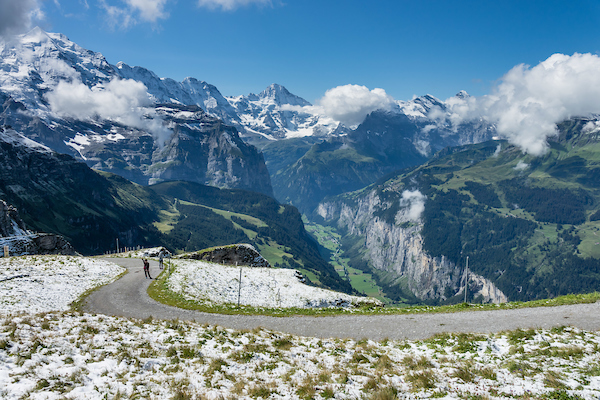If Switzerland travel suffers from one thing, it’s a lack of familiarity with the country’s history, geography, and culture. Switzerland’s story isn’t as well known as France’s, Germany’s, or England’s, and outsiders have always perpetuated stereotypes about the Swiss.
Long story short, it’s hard to get to know the real Switzerland. But we’re here to help! Here’s everything that makes Switzerland tick. (Insert joke about watch-making.)

Switzerland’s history
Switzerland’s modern history began on August 1, 1291. On that day, three separate cantons vowed to protect each other from outsiders.
Over time, additional cantons joined the confederation and beat European powerhouses, including Burgundy. But in 1515, the French defeated the Swiss at Marignano (Italy), and the Swiss agreed not to fight the French ever again. In fact, that’s when the Swiss became neutral, although they still raised armies for other European nations.

Not long after Marignano, the Reformation arrived in Switzerland, splitting the country into Catholics and Protestants. It also gave rise to John Calvin and other influential Reformers. The division wasn’t totally clear cut, but in general, northern and western Switzerland became Protestant, while central Switzerland remained Catholic.
Napoleon showed up in 1798 and abolished the Old Swiss Confederacy to create a centralized government. The Swiss didn’t like that very much, so he tried restoring cantonal powers and adding six new cantons to the mix. But it wasn’t enough to save him — in 1813, the Swiss ousted him for good.
By 1848, the Swiss finally felt ready for centralized government, so they wrote their Federal Constitution. By this time, Switzerland was comprised of 26 cantons (still the current number). Today, Switzerland is the most democratic country in the world, and citizens vote in referendums three or four times a year.

Switzerland’s geography
Switzerland’s geography sets it apart. After all, a huge section of the Alps runs through the country, and only a few other nations share that claim to fame. In addition, Switzerland is home to the Jura Mountains and the Swiss Plateau.
The Alps lie in the southeast, while the Jura is located in the northwest. The Swiss Plateau is nestled between these two mountain ranges. Most residents live on the Plateau, so that’s where you’ll find cities like Geneva, Lausanne, Bern, Lucerne, and Zurich.
Some of the best-known Alpine regions include the Bernese Oberland (where well-known peaks include Eiger and the Jungfrau) and the Valais (home to the Matterhorn).
Fun fact: there are 48 peaks in Switzerland that are taller than 4,000 meters (13,123 feet).
It’s normal to experience a touch of altitude sickness after arriving in Switzerland. Most travelers will just have mild cases, so treat your symptoms by drinking lots of water, avoiding alcohol, and taking over-the-counter pain medication. Don’t let that stop you from enjoying the wonders of the Haute Route or the Lauterbrunnen Valley!
The climate is moderate, although the temperature varies dramatically between elevations. No matter when you visit, dress in layers, and bring a raincoat!

Switzerland travel and culture
Looking for a few ideas on what to do once you arrive in Switzerland? We can help you there, but you might want to brush up on Swiss customs first!
The Swiss like things done a certain way. They expect formality from strangers and firm handshakes from everyone, and they think small talk is pointless. They always great storekeepers and hikers with the word “grüezi.” And they really value punctuality, so don’t be late!

Switzerland borders several nations, and residents are strongly influenced by surrounding cultures. German speakers live in the country’s center, while French speakers live in the west and Italian speakers in the south.
Less than 1 percent of residents speak Romansh, a direct descendant of Latin that somehow survived the centuries.
Traditional cultural practices include yodeling and playing the alphorn, although these are not as common today as they were in the past.
Of course, Swiss cuisine is one of the most important aspects of Swiss culture. Switzerland travel just isn’t complete without eating raclette (cheese that’s melted over potatoes and onions), but there are many other specialties worth trying.
Lastly — and it almost goes without saying — visit a chocolatier and try some of the most mouth-watering sweets you’ll ever eat.
If you’d like to travel to Switzerland with us, check out the tours we offer — from hiking and trekking trips, to rail tours, food tours, winter tours, and even Tolkien tours. We’ll book your hotels (we shared a few tips for making hotel reservations in this blog post), order your rail passes, make your arrangements, and even transport your luggage! After all, there are plenty of reasons why you should make Switzerland your next big destination.
And if you’d like to test your knowledge and see how well you know Switzerland, try taking our quiz — and let us know if you pass!
- It’s almost Swiss National Day! - July 26, 2018
- Celebrating Christmas in Switzerland - June 25, 2018
- The Tour du Mont Blanc: one of the world’s greatest adventures - June 7, 2018


